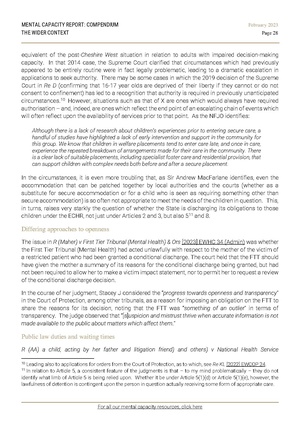R (Maher) v First-tier Tribunal (Mental Health) [2023] EWHC 34 (Admin)
Failure to provide reasons to victim (1) The Mental Health Tribunal in its first decision, in which it had refused to provide the mother of a victim of manslaughter the reasons for the conditional discharge decision, or a gist of them, had unlawfully fettered its discretion by applying a blanket policy or practice. (2) Around a year later, after judicial review permission on the "blanket policy" ground had been granted, the Deputy Chamber President decided to make a further decision. The tribunal had power to make this decision under its case management powers, but the decision itself was unlawful: (a) instead of directing herself that departing from the open justice principle can only be justified in exceptional circumstances when strictly necessary to secure the proper administration of justice, the DCP jumped straight to the presumption of privacy contained in the tribunal's rules; as a consequence she did not engage with the purpose of the open justice principle which is to both assist in justice being done through transparency and also to enable the public to have confidence in the system; (b) her focus on the mother's motives, which should not have been given weight in the overall balance, clouded her consideration of other, more relevant issues; (c) she did not direct herself that the extent of the derogation from the principle of open justice should be no more than is strictly necessary to achieve the desired purpose, and did not consider providing the mother with a gist or summary of the reasons; (d) she did not explain why a redacted version of the conditional discharge decision could not meet the patient's privacy rights or why redacted reasons were "not possible"; (e) she did not adequately explain her reasons; (f) she did not engage sufficiently with the reasons that the mother had put forward. The court noted: "The direction of travel in the last 30 years or so has been towards openness and a more rigorous scrutiny of exceptions to the open justice principle and creative thinking about how conflicting rights can be reconciled." (3) The refusal to provide the gist of the reasons for the conditional discharge decision, when the Parole Board would have provided a gist of its reasons in similar circumstances, was unlawful discrimination under Article 14 in relation to the mother's Article 8 rights. (4) The tribunal's decision not to allow a Victim Personal Statement, and the inability of a victim to request a reconsideration, were not unlawful discrimination given the different functions of the PB and the MHT.
See also
- Provision of tribunal reasons to victims — The High Court has decided that the tribunal's previous blanket policy of refusing to provide reasons to victims was unlawful; the further refusal decision made during the JR proceedings was also unlawful and had failed to engage with the purpose of the open justice principle; and a refusal to provide a gist of the reasons when the Parole Board would provide this in similar circumstances is unlawful discrimination. See R (Maher) v First-tier Tribunal (Mental Health) [2023] EWHC 34 (Admin).X
- MHT and victims. Jag Bahra, 'High Court victory for victims' rights and open justice' (Saunders Law, 13/1/23) — This press release notes that: (1) prior to the decision in R (Maher) v First-tier Tribunal (Mental Health) [2023] EWHC 34 (Admin), the Mental Health Tribunal was "perhaps the only Court left that operates entirely in secrecy, such that its decisions are beyond any public scrutiny"; (2) the tribunal has indicated that it intends to update its Practice Guidance to make it clear that victims are in fact entitled to request reasons when a patient is discharged; and (3) the Government has also indicated in a consultation that it supports proposals to allow victims to provide a Victim Personal Statement when a patient is being considered for discharge, which would bring the Tribunal's practice closer into line with the Parole Board.
Essex
This case has been summarised on page 28 of 39 Essex Chambers, 'Mental Capacity Report' (issue 129, February 2023).Full judgment: BAILII
Subject(s):
- Powers🔍
Date: 13/1/23🔍
Court: High Court (Administrative Court)🔍
Judge(s):
- Stacey🔍
Parties:
Citation number(s):
What links here:- Victims of crime
- Jag Bahra, 'High Court victory for victims' rights and open justice' (Saunders Law, 13/1/23)
- 39 Essex Chambers, 'Mental Capacity Report' (issue 129, February 2023)
- Jonathan Wilson, 'Mental health case law: update' (Legal Action, May 2023)
- Annual Review 2023
- Victims (MHT)
Published: 13/1/23 23:57
Cached: 2025-01-22 15:45:10
The following categories (in blue boxes) can be clicked to view a list of other pages in the same category:
